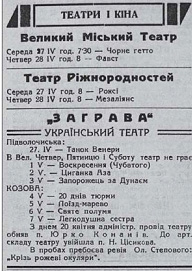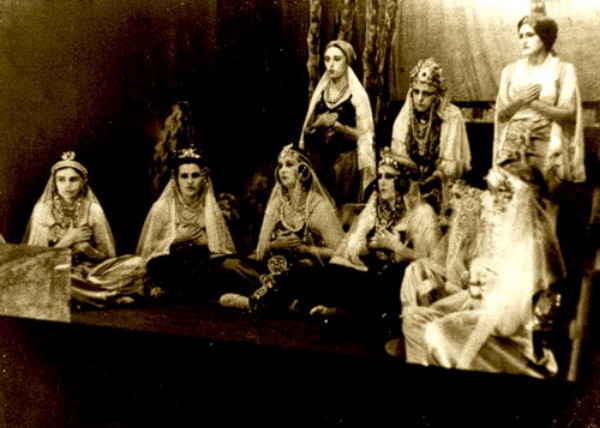Zahrava Theater
Zahrava Theater [Український молодий театр «Заграва»; Ukrainskyi molodyi teatr ‘Zahrava’]. The foremost theater in Western Ukraine during the interwar period, organized by Volodymyr Blavatsky in Peremyshl in 1933 from the cast of an extant Zahrava theater (est 1931 by O. Stepovy) and from part of the cast of the Tobilevych Theater. Zahrava continued the innovative experimentation of Berezil: it introduced the chorus in its adaptations of Vasyl Stefanyk’s Zemlia (The Earth) and plastic-mass scenes in Bohdan Lepky’s Baturyn; modernized the text of Mykhailo Starytsky’s Oi, ne khody, Hrytsiu ... (Don’t Go to Parties, Hryts ...); performed new Ukrainian dramas of national-political, historical, and religious significance, such as Oleksander Oles’s Obitovana zemlia (The Promised Land), Zenon Tarnavsky’s Taras Shevchenko, and Hryhorii Luzhnytsky’s Duma pro Nechaia (Duma about Nechai) and Holhota (Golgotha); and staged modern European plays, including M. Pagnol and P. Nivoix’s Les Marchands de Gloire and Somerset Maugham’s The Sacred Flame. In 1938 Zahrava united with the Tobilevych Theater to form the Kotliarevsky Theater (later the Lesia Ukrainka Theater).
BIBLIOGRAPHY
Revuts'kyi, Valeriian. V orbiti svitovoho teatru (Kyiv, Kharkiv, and New York 1995)
[This article originally appeared in the Encyclopedia of Ukraine, vol. 5 (1993).]


